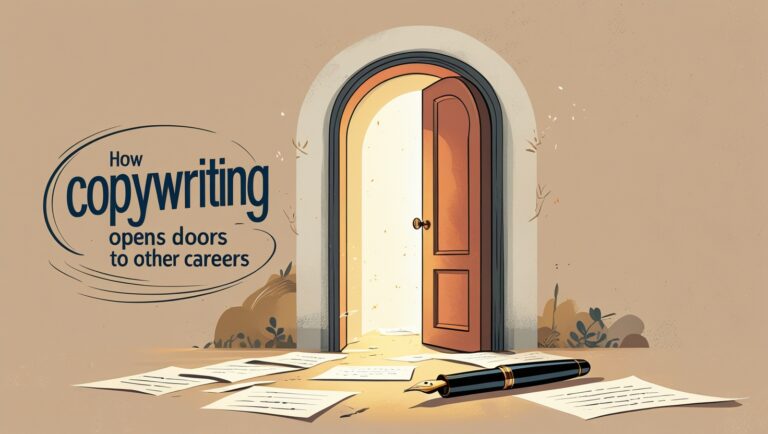What Is a Copywriter and What Is It Like to Work as One?
Have you ever wondered who creates the compelling headlines and persuasive messages that encourage you to click “Buy Now” or sign up for a newsletter? The answer is a copywriter, a specialized professional writer trained to grab your attention, spark your emotions, and guide you toward a desired action.
In this article, you will discover what a copywriter does, the essential skills they need, and why a career in copywriting can open countless doors. By the end, you will understand the daily realities of working as a copywriter and how to start your journey in this in-demand profession.
Defining the Role of a Copywriter
A copywriter is a marketing professional who writes persuasive content for businesses, brands, and entrepreneurs. Their primary task is to craft words that inspire a specific response, such as visiting a website, requesting more information, or making a purchase. In short, a copywriter transforms ordinary text into a powerful marketing tool.
Moreover, the role of a copywriter goes beyond basic writing. They study buyer psychology, analyze market trends, and collaborate with designers, marketers, and project managers to deliver cohesive campaigns. By understanding the customer’s needs and emotions, a copywriter tailors messages that resonate on a personal level.
Different Work Settings
- Agency Copywriter: Works in a fast-paced agency environment, handling multiple clients across diverse industries. This setting is dynamic and frequently involves strict deadlines.
- In-house copywriter: This type of writer focuses on one brand or company. The writer often has a deeper understanding of the brand’s voice, leading to more consistent messaging.
- Freelance Copywriter: Operates independently, choosing projects and setting schedules. The freedom is attractive, but it requires strong self-discipline and self-promotion.
The copywriter’s work is omnipresent: from product descriptions and email campaigns to social media ads and taglines. Their voice drives customer engagement and ultimately influences profitability.
Essential Skills Every Copywriter Needs
Being a copywriter requires more than just writing ability. While writing skill is a vital component, other qualities help set successful copywriters apart. Below are the key attributes that matter most:
- Research Proficiency: Effective copy depends on accurate information. Copywriters often study competitors, target demographics, and current market demands. A keen research ability ensures that your messaging is both credible and compelling.
- Empathy: Understanding the reader’s perspective is crucial. By tapping into the emotional needs of the target audience, a copywriter can tailor text that addresses specific pain points or desires.
- Storytelling: Everyone loves a good story. Incorporating storytelling elements such as conflict, resolution, or transformation can make your message more memorable.
- Adaptability: Different brands require different tones. A skilled copywriter can shift from a playful, conversational style to a formal, authoritative one, depending on the brand’s audience and goals.
- Grammatical Mastery: High-level grammar and punctuation skills are a must. This is not just about following rules; clarity and precision add credibility to your content.
- Persuasion: Copywriting is ultimately about influence. It uses persuasive triggers—such as time-limited offers (scarcity), testimonials (social proof), or expert quotes (authority)—to inspire action.
In addition, seasoned copywriters are open to personal growth. They often invest in courses, attend webinars, and follow industry publications such as the American Writers & Artists Institute (AWAI) to stay current.
Types of Copywriting Projects
The world of copywriting is vast. Professionals in this field tackle different formats based on the needs of their clients or employers. Below are several common project types:
Marketing Campaigns
Marketing campaigns usually consist of emails, social media posts, landing pages, and advertisements. In these campaigns, the copywriter’s job is to maintain a unified brand voice while addressing different audience segments. A series of emails, for instance, may need separate tones for new leads, recurring customers, and VIP clients.
Website Copy
Website copy covers everything from the homepage hero text to product pages, about pages, and calls to action. Here, clarity and user experience are paramount. A skilled copywriter ensures potential customers find answers quickly and feel drawn to engage further.
Sales Pages and Landing Pages
Landing pages are specialized web pages designed to lead the reader to a singular action, such as purchasing a product or signing up for a service. Because of their singular goal, these pages often showcase a blend of persuasive storytelling, testimonials (social proof), and time-sensitive offers. Crafting high-converting landing pages is considered one of the most lucrative skills in the copywriting field.
Blog Posts and Articles
Although traditional blog posts may lean more toward content writing, many businesses require a subtle sales angle even in informational pieces. Copywriters skilled in SEO (Search Engine Optimization) can weave keywords naturally, create compelling headlines, and incorporate calls to action, resulting in articles that inform readers while also guiding them toward the next step.
Video Scripts and Podcast Intros
Copywriting is not limited to written form. Many copywriters script video ads, podcast intros, and even the content for corporate webinars. The goal remains the same: engage, persuade, and prompt further interest in a product or service.
Through diverse projects, a copywriter hones flexibility and a deeper understanding of marketing psychology. This variety makes the career exciting and ensures no day is ever the same.
A Day in the Life of a Professional Copywriter
Daily tasks for a copywriter vary, but certain steps recur. Understanding this routine can help you understand what it is like to work in the field.
- Morning Planning and Research
Many copywriters start the day by reviewing their current projects. They update task lists, check emails, and gather resources. Research may include reading the client’s brief, studying competitor websites, and looking up industry facts for credibility. - Writing Sessions
Once the foundation is set, it is time to write. This can mean drafting an email sequence, brainstorming taglines, or outlining a blog post. Most copywriters break their writing tasks into multiple chunks to maintain focus and allow ideas to ferment naturally. - Editing and Proofreading
After writing, copywriters usually step away from the text for a short period before editing. This distance helps them see mistakes or awkward phrasing more objectively. Proofreading software can help, but a trained eye is still vital. - Client Communication
Whether in-house or freelance, regular communication with clients or team members is a must. Copywriters often adjust their work based on feedback from marketing managers, art directors, or brand strategists. - Professional Development
Many copywriters dedicate part of their day to improving their skills. They may read articles on platforms like HubSpot, watch tutorials, or take online courses. The industry evolves quickly, so staying updated is essential.
This combination of research, writing, collaboration, and continuous learning makes each day unique. For many, it is the diversity of tasks that makes being a copywriter an engaging and fulfilling career.
Why Copywriting Offers a Unique Path to Success

Copywriting is more than just a job. It can be a pathway to financial stability, professional growth, and creative satisfaction. Here are a few reasons why:
- High Demand Across Industries
Almost every industry needs effective copy to sell products or communicate with customers. From tech startups to e-commerce giants, businesses rely on persuasive messages to stand out in a crowded marketplace. This breadth of demand offers copywriters abundant opportunities. - Limitless Earning Potential
Skilled copywriters can earn substantial fees, especially if they specialize in high-value niches like direct-response campaigns or sales pages. Many copywriters also increase their rates by demonstrating proven results, such as improved conversion rates or notable client testimonials. - Professional Growth and Networking
Copywriters often collaborate with marketers, designers, and brand managers. This collaboration fosters valuable connections in the broader marketing world. Over time, these relationships can lead to referrals, exclusive projects, or even partnerships. - Remote Work and Lifestyle Flexibility
With the rise of digital marketing, many companies allow remote or flexible work arrangements. This means you can work from anywhere—home, a café, or even another country—without sacrificing quality or productivity. - Personal Brand Building
You can develop a personal brand by demonstrating expertise in writing persuasive content. Through consistent results and testimonials, you establish social proof that attracts higher-profile clients. This snowball effect can lead to invitations to speak at conferences or guest blogs on high-traffic sites.
Moreover, a background in copywriting equips you with skills that transfer into related fields such as content marketing, brand strategy, or even creative direction. As you gain more experience, you may diversify your service offerings or move into leadership roles.
How to Kickstart Your Copywriting Journey
You might be wondering how to become a copywriter if you are starting from scratch. While there is no single path, certain steps can give you a strong foundation:
- Build a Portfolio
Start by creating sample pieces for imaginary or real clients. It can still show your skill even if you write content for a friend’s small business. Potential clients often scan these samples to gauge your style and capabilities. - Leverage Online Platforms
Platforms like Upwork or Fiverr can offer an entry point. While fees on these platforms can start low, they provide beginner copywriters with practical experience and initial reviews. Over time, you can raise your rates and migrate to higher-paying projects. - Study Copywriting Principles
Read seminal books such as “Ogilvy on Advertising” or explore free resources on sites like HubSpot’s Marketing Blog. Familiarizing yourself with classic and modern techniques helps you understand how to write words that sell. - Mentorship and Networking
Seeking guidance from an experienced copywriter or joining a local marketing meetup can boost your growth. Feedback from a seasoned professional can highlight areas that need refinement and confirm strengths you might not see on your own. - Consider a Structured Program
Investing in a dedicated course can accelerate your progress if you are serious about elevating your skills and income. Some programs cover topics like developing a brand voice, writing highly effective email campaigns and optimizing copy for conversions.
For a deeper dive into launching your own side hustle, check out this valuable resource:
Unlock Your Life Breakthrough: Start a Copywriting Side Hustle
Through consistent practice and learning, you can develop the confidence and expertise needed to stand out in the competitive realm of professional writing.
The Business Side of Copywriting
While writing is the core craft, treating your services like a business can elevate your success. Professionals who handle contracts, billing, and taxes properly often find themselves more stable in the long run. Consider the following steps:
- Set Clear Rates: Determine your pricing model, whether per project, per hour, or per word. Clarity avoids misunderstandings and helps you confidently negotiate with clients.
- Create Systems: From proposal templates to automated invoicing, developing efficient systems frees up time for writing.
- Maintain Client Relationships: Follow up with past clients to inquire about future needs. Maintaining an existing relationship is easier than constantly searching for new clients.
- Track Results: Whenever possible, gather metrics such as open rates, click-through rates, or sales increases. Compiling a results-based track record strengthens your credibility.
Moreover, do not be afraid to market yourself aggressively. This might mean guest posting on relevant blogs, maintaining an active LinkedIn profile, or even speaking at virtual events. Each small step can lead to higher visibility and a stronger personal brand.
Common Challenges and How to Overcome Them
Like any profession, copywriting comes with hurdles. Recognizing these challenges in advance can help you navigate them more effectively:
- Writer’s Block
Sometimes the words just do not flow. Setting a routine, taking breaks, or employing brainstorming techniques (such as freewriting) can unclog creativity. - Client Misalignment
Miscommunication with clients can happen. Clear briefs and regular check-ins reduce misunderstandings. Setting precise expectations from the start is also vital. - Underpricing
Beginners often underprice their services to land jobs. While it is fine to gain experience, remember to raise your rates in line with your growing expertise. Low fees can signal low value, potentially discouraging premium clients. - Staying Inspired
Copywriting can be mentally demanding. Reading widely, trying new writing exercises, and attending industry webinars can refresh your perspective and spark new ideas. - Time Management
Juggling multiple projects requires discipline. Tools like Trello, Asana, or a simple spreadsheet help organize deadlines. Using time-blocking methods can also enhance efficiency.
By staying alert to these potential pitfalls, you can strengthen your resilience and position yourself as a reliable copywriter in a competitive market.
Conclusion
Becoming a copywriter involves more than writing compelling text. It demands market knowledge, empathy, storytelling, and a commitment to continuous self-improvement. The rewards, however, range from flexible work arrangements to limitless earning potential.
As you venture into the realm of copywriting, remember that practice, feedback, and networking are invaluable. If you are seeking an edge to accelerate your journey, explore specialized training programs or connect with mentors who have walked the path before you. By investing in your craft and building a results-driven portfolio, you will position yourself as a sought-after professional in one of the most dynamic and rewarding fields in marketing.
Ready to take the next step? Subscribe to industry newsletters, share this article with friends, and consider enrolling in a focused course that aligns with your goals. The possibilities are vast for those willing to learn, adapt, and consistently hone their skills.
FAQ
What Should I Look for in a Copywriting Course or Program?
Seek a program that covers key areas such as writing fundamentals, marketing psychology, SEO integration, and client acquisition strategies. Instructor credibility is also crucial. Look for proven experts who share tangible examples of success.
Do I Need a Degree to Become a Copywriter?
A degree in English, Marketing, or Communications can help, but it is not always necessary. What matters most is a robust portfolio, strong writing samples, and an understanding of consumer behaviour. Many successful copywriters are self-taught or come from non-writing backgrounds.
How Long Does It Take to See Results?
It varies. Some see rapid progress within a few months, especially if they dedicate significant time to learning and practice. Others grow slowly but steadily. Focus on quality work, client feedback, and constant skill enhancement to accelerate your success.
By following these insights and maintaining dedication to the craft, you can thrive as a skilled copywriter in a world that increasingly values persuasive communication.







One Comment
Comments are closed.